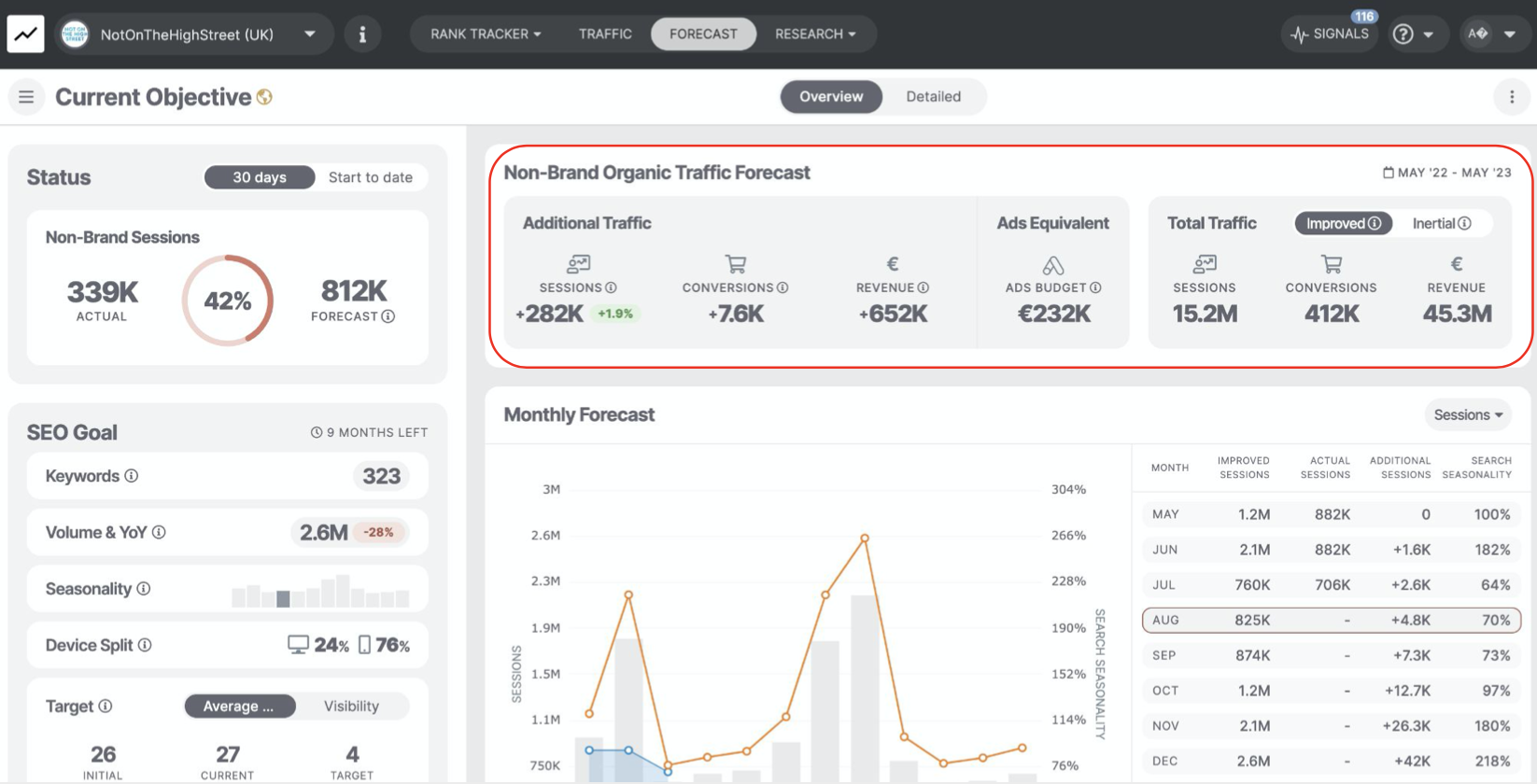[ad_1]
Need to prove your SEO proposal’s ROI?
Will your executive team only approve a proposal if it provides clear value to their business?
You know what’s needed for SEO to drive success, but how do you prove the pathway there?
SEO forecasting can come in handy.
Align sales, SEO specialists, and customers with proven, transparent, precise, and reliable SEO forecasting.
On August 31, I moderated a webinar by Anca Țenea, Community Manager at SEOmonitor, and Edward Coram James, Chief Executive at Go Up.
Țenea and James demonstrated how SEO forecasting could help you solve your organization’s specific business problems.
Here is a summary of the webinar. To access the entire presentation, complete the form.
Why Forecast SEO?
For clients, SEO forecasting is done to help them understand how much revenue they can expect to gain from organic search.
As part of your sales process, you can use it to stress test whether you should take a client on.
[Learn how to get great clients with stress testing] Instantly access the webinar →
SEO forecasting helps accurately discover:
- Agency profitability.
- Client churn.
- The need for a larger marketing budget & a larger sales team.
- Well-selected clients that remain for much longer.
In fact, when it comes to well-selected clients, we recommend that you run an internal forecast for a potential client, just for yourself or your agency.
When you run the numbers, you’ll know what it will cost to get the client measurable results.
[See the SEO forecasting client selection process] Instantly access the webinar →
At this point, you’ll have a great pitch for your prospective client that will help you:
- Provide results that make the client happy.
- Enable you to retain the client for a more extended period.
- Gain greater profitability and business for you.
When To Forecast SEO
Existing clients: Build a forecast after months three, four, or five of an active campaign.
At this point, you will have populated a whole gamut of keywords, which means you’ll be able to trust the final number.
[See this in action] Instantly access the webinar →
New clients: Forecast SEO before signing them on as an internal stress test and qualification test, as mentioned above.
What To Include In A Reliable SEO Forecast
A reliable forecast validates any opportunity from two perspectives:
- Assessing the client’s potential.
- Evaluation of the campaign’s budget and ROIs.
These two endpoints will help you have all of the information you need to explain SEO’s tangible success to your team and stakeholders.
[Easily see what’s included in a SEO forecast] Instantly access the webinar →
So, you’ll need to consider these five aspects:
- Intention.
- Data.
- Conservatism.
- Traceability.
- Accuracy.
To get there, you’ll need to input two main controllable metrics: keywords and ranks.
How To Build A Successful SEO Forecast
Using the following steps, you can gain a better understanding of data modeling and explain your plan to stakeholders:
Step 1: Set your desired ranking target.
[Find out what ranking target you should choose] Instantly access the webinar →
Step 2: Determine which keyword variables may influence your overall forecast:
- The average CTR curve.
- Search volume, year-over-year trends, and seasonality.
- Device segmentation.
- Past conversion rate.
- Long-tail effect.
- Non-brand organic traffic additional improvements.
Step 3: Plug the data into your favorite SEO Forecasting tool and watch the forecast appear.
 SEOmonitor’s SEO Forecast, August 2022
SEOmonitor’s SEO Forecast, August 2022[Watch SEO Monitor’s use case] Instantly access the webinar →
When you approach forecasting this way, you’ll be able to:
- Validate the SEO opportunity and necessary budget.
- Quantify the SEO effort impact on a longer-term basis.
- Align expectations between sales, marketing, and other stakeholders.
- Gain confidence in the potential future outcomes.
[Slides] How To Forecast SEO Outcomes With Better Precision & Transparency
Here’s the presentation.
Join Us For Our Next Webinar!
Boost Organic & Paid Traffic: How To Bring Your SEO & SEM Teams Together
Are you Team SEO or Team SEM? How do you feel about joining forces to make your marketing campaigns surprisingly better?
Learn the strategies and benefits of aligning paid and organic efforts to maximize your marketing team’s ROI.
Image Credits
Featured Image: Paulo Bobita/Search Engine Journal
[ad_2]
Source_ link



![Brian Dean Of Exploding Topics On His Career Switch & His Biggest SEO Lessons [DesignRush Spotlight]](https://blog.topseosupertools.com/wp-content/uploads/2022/11/NewsImage_vcsPRAsset_3576344_247245_5da3071c-3fc2-4c48-a8a2-b8849facc98b_0.png)











